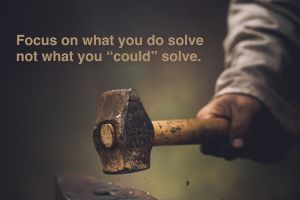I started Lumastic with no intention of starting a business. The idea came to me out of my own pain as a small creator. Building a channel can be extremely lonely, and when I needed help or wanted intimate feedback from peers, the best options were private, invite-only Slack/Discord channels that left a lot to be desired.
I just felt like the community deserved more specific, professional tools to connect and collaborate while at work. I also happened to be getting a CS degree and had been making websites for 4 years at that point. So, I naively thought, “I should just make collaboration software for creators”. And thus Lumastic was born.
Soon after our first launch, I got involved in the entrepreneurship ecosystem. Suddenly, I was devouring books and blogs on startups while building relationships with mentors who knew a lot more about business than I did. And I started to experience this problem that would plague me for the next 2 years. No one understood what I was talking about.
If I used the word “creator” or “YouTuber”, I lost the audience. Even 3 years ago, most people in the central VA network did not understand the industry or see these people as business owners. And I wasn’t smart enough yet to translate what we were doing as, “We’re B2B workplace software for production companies”.
So, being an impressionable people pleaser who was tired of rejection, I made probably the biggest mistake of the last 4 years: I changed our customer segment. Instead of focusing on solely creators, we “pivoted” to try and cater to entrepreneurs from all walks of life: artists, freelancers, startups, etc.
Casting this wider net made everything easier on the surface and seemed like a great move. It made it easier to connect with “potential customers”, explain our business to mentors and peers, and it made the TAM on our pitch deck look huge.
However, by not niching down to the customer segment with the actual identified problem, we were building a product that pleased no one. And because that is a reality no founder wants to face, it lead to a ton of self-destructive behaviors that I’ll address more in later sections.
So, the big takeaway here is to focus on the problem you’ve identified and the opinions of the people with that problem. Those people are the experts you should listen to.
Note: This is part of a larger blog series on 10 Things I Learned From My First Failed Startup. Checkout the rest of the series and tweet your thoughts at me.

